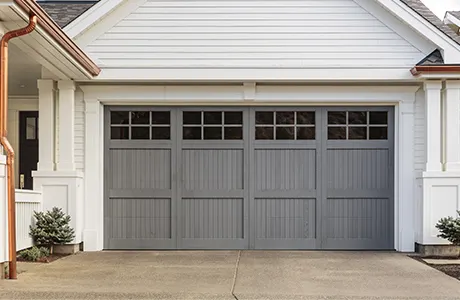The Rockwall Garage Door Repair is a vital component of your home, providing security, convenience, and curb appeal. When faced with issues, the temptation to embark on DIY garage door repair may seem appealing.

However, it’s crucial to recognize the potential risks associated with attempting repairs without professional expertise. In this article, we’ll explore the top three risks of DIY garage door repair and highlight why seeking professional help is the safer and more effective choice.
1. Personal Safety Hazards:
One of the primary risks of DIY garage door repair is the potential for personal safety hazards. Garage doors are heavy and operate under tension, especially when it comes to components like springs and cables. Mishandling these components without the proper knowledge and precautions can lead to accidents and injuries.
a. Spring Tension:
Garage door springs are under significant tension to counterbalance the weight of the door. If not handled correctly, releasing or adjusting the tension on springs can result in severe injuries. The force exerted by garage door springs is powerful enough to cause fractures, bruises, or even more critical injuries. Professional technicians are trained to handle spring-related tasks safely, minimizing the risk of accidents.
b. Falling Doors:
Attempting to repair a garage door without proper support and precautions can lead to the door unexpectedly falling. This is especially true if the door is not adequately secured during repairs. A falling garage door poses a significant risk of injury, potentially causing fractures, bruises, or even more severe harm. Professional technicians employ safety measures and support systems to prevent the door from falling during repairs.
c. Pinch Points and Moving Parts:
Garage doors have numerous moving parts, including rollers, hinges, and cables. DIY repair attempts without a thorough understanding of these components can result in pinch points and entanglements. Accidental contact with moving parts can cause injuries, ranging from minor cuts and bruises to more severe harm. Professional technicians are trained to work around these components safely and know how to avoid potential hazards.
2. Lack of Expertise:
DIY enthusiasts may possess various skills, but garage door repair requires specific expertise and knowledge of the system’s intricacies. Lack of expertise is a significant risk when attempting DIY garage door repairs, as it can lead to improper diagnoses, ineffective solutions, and further damage to the door.
a. Inaccurate Diagnoses:
Identifying the root causes of garage door issues requires a comprehensive understanding of the system. DIY attempts may result in inaccurate diagnoses, addressing only the visible symptoms rather than the underlying problems. Without the proper expertise, homeowners may end up applying temporary fixes that fail to address the actual issues, leading to recurring problems.
b. Incorrect Repairs:
Garage doors are equipped with various components, each serving a specific purpose. Performing repairs without a clear understanding of these components and their functions can lead to incorrect repairs. Misaligning tracks, improperly adjusting spring tension, or using the wrong tools can exacerbate issues and cause further damage to the door. Professional technicians are trained to accurately diagnose problems and implement precise repairs.
c. Compromised Safety Features:
Garage doors often come with safety features such as photo-eye sensors that detect obstacles in the door’s path. DIY repairs may inadvertently compromise these safety features, posing risks to both individuals and property. Professional technicians are well-versed in the intricacies of garage door safety features and ensure that repairs are conducted without compromising these critical elements.
3. Increased Costs and Additional Damage:
While the initial intent of DIY garage door repair may be to save money, it can lead to increased costs in the long run. The risk of causing additional damage, the potential for inaccurate repairs, and the need for professional intervention after DIY attempts can result in higher overall expenses.
a. Additional Damage:
DIY repairs carry the risk of causing additional damage to the garage door system. A well-intentioned attempt to fix a specific issue may inadvertently lead to new problems. For example, using incorrect tools or applying excessive force during repairs can damage components, exacerbating the original issue and necessitating more extensive repairs.
b. Complications and Delays:
Inaccurate DIY repairs often result in complications and delays. If the initial repair attempts prove ineffective, homeowners may need to seek professional assistance to address the lingering problems. This not only extends the repair timeline but also increases the overall costs associated with fixing the garage door.
c. Voided Warranties:
Many garage doors and components come with warranties that are contingent on professional installation and repairs. DIY attempts may void these warranties, leaving homeowners responsible for the full cost of any necessary repairs or replacements. Seeking professional help ensures that repairs are conducted in a manner that preserves warranties and guarantees.
In conclusion, the risks of DIY Rockwall Garage Door Repair extend beyond the potential for personal injury. Lack of expertise can lead to inaccurate diagnoses, incorrect repairs, and compromised safety features. The increased costs associated with additional damage, complications, and voided warranties make DIY attempts less cost-effective in the long run. Prioritizing safety, accuracy, and efficiency underscores the importance of seeking professional help for garage door repairs. Professional technicians bring the required expertise, safety protocols, and a track record of successful repairs, ensuring that your garage door operates optimally and safely. When it comes to the functionality and safety of your garage door, professional intervention is the wise and secure choice.
BH Garage Doors and Gates
1-214-206-5231

Leave a Reply